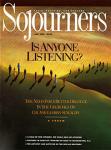Rock critic Lester Bangs was probably the most astute cultural observer of the 1970s. Bangs is best known today as the critic who, in his '70s work for the Detroit-based Creem magazine, summoned punk rock into existence several years before there was actually a music of that name. But in the years before his death in 1982, Bangs was also working on pieces of a mammoth novel that would sum up the '70s zeitgeist of numbed isolation. It was to be called All My Friends Are Hermits.
I'm afraid that if he had survived, the '80s Bangs sequel might have been called All My Friends Are Lawyers. That's certainly the way it seems to me sometimes. Well sure, a few of my friends are teachers, and I even know one professional community organizer. But the number of lawyers in my peer group is astounding.
I have a feeling that the same professional demographics must apply in the social circles of television screenwriters. That would explain why they feel compelled to spin script after script about the legal profession.
Even my lawyer friends agree that America has far too many lawyers. Now we also have far, far too many TV shows about lawyers. Sure, I watch LA Law like almost everybody else. But I hit the wall with Equal Justice and only sampled The Trials of Rosie O'Neill (briefly) out of respect for the corpse of Cagney and Lacy. I watch Against the Law on Fox, but only because the star (Michael O'Keefe) is Mr. Bonnie Raitt. I can't bring myself to get near The Antagonists, which I gather from the promos is a sort of neo-bratpack "Young-Top-Gun-Lawyers in Love" thing.
AS TRAGEDIES GO, an excess of lawyers, and even a plague of law-driven dramas, hardly ranks up there with the plight of the Palestinians or the Kurds. In fact it would hardly be worth mentioning at all except that it may cause some viewers who should know better to write off Shannon's Deal as just another lawyer show.
Of course, Shannon's Deal is a lawyer show. But with a difference. If nothing else, what was the last prime-time show set in Philadelphia? In that setting Jamey Sheridan plays Jack Shannon. Shannon was the rising star at the city's top firm until his compulsive gambling drove him over the edge. He lost his job, his marriage, and his self-respect. Now in recovery, Shannon has set up shop as a sole practitioner in a grubby little office with a Puerto Rican secretary (Elizabeth Pena) and a manual typewriter.
He is, as he says in the weekly opening voice-over, "keeping things low pressure, one day at a time." In his old life, Shannon represented slumlords and polluters (it's where the money is). Now he only takes cases his conscience can live with. He's traded the Mercedes for mass transit and has an apartment in a working-class building. Shannon is, as the fourth of the 12 Steps has it, making his amends. And not just spiritually. He still has major loan-shark debts to pay from his gambling days. The friendly neighborhood collector/enforcer is a regular character.
Shannon's Deal debuted last year. It ran for six episodes in the spring, was pulled off the air, and then brought back for a similar run this year. Of course, I was drawn to Shannon's Deal by the left-wing pop populist credentials of writer and director John Sayles (Return of the Secaucus Seven, Lianna, Matewan, Eight Men Out, and others). Sayles "created" Shannon's Deal, which means he lined out the concept and characters, wrote the first scripts and closely supervised the next few. He continues to carry a "creative consultant" credit. Those more refined than I might also have been attracted to the show by the participation of the great jazz trumpeter Wynton Marsalis, who contributes the theme and occasional background music.
That level of talent assures that Shannon's Deal will at least be a high quality lawyer show. But in fact the show is much more. It is a morality tale about the '90s, told in hour-drama episodic form. Like a lot of people in high places, Shannon spent the '80s getting very rich and destroying lots of people's lives, his own included. Compulsive gambling is a perfect metaphor for the big money world of the Reagan era.
Like Reaganaut capitalism, gambling is all about money. But in both cases money is in the end just a way of keeping score. Ultimately the game is about power and control. Beating the odds means beating fate. It means being God -- that's the buzz. In one episode this season, Shannon briefly falls off the wagon, and we see the god-like high take hold and render everything else, including his daughter's birthday, insignificant.
After bottoming out and facing his weakness, Shannon, (lapsed) Irish Catholic that he is, is spending the '90s doing penance. For him, as for millions of others in America today, recovery is a barely secularized religion, and one that often works barely secularized miracles.
But in Shannon's Deal recovery is also a metaphor for social reconstruction. Jack Shannon's path through his post-'80s hangover involves accepting limitations; setting clear and principled priorities; facing up to the consequences of his actions; service to others as a route to fulfillment; and, perhaps above all, a rigorous, unblinking, and unbending adherence to the truth, inconvenient as it may be. That's all standard 12-Step stuff. But it can also be a program for America's post-Reagan recovery. The candidate with the guts to run on it, and mean it, would probably win.
Danny Duncan Collum is a contributing editor of Sojourners.

Got something to say about what you're reading? We value your feedback!